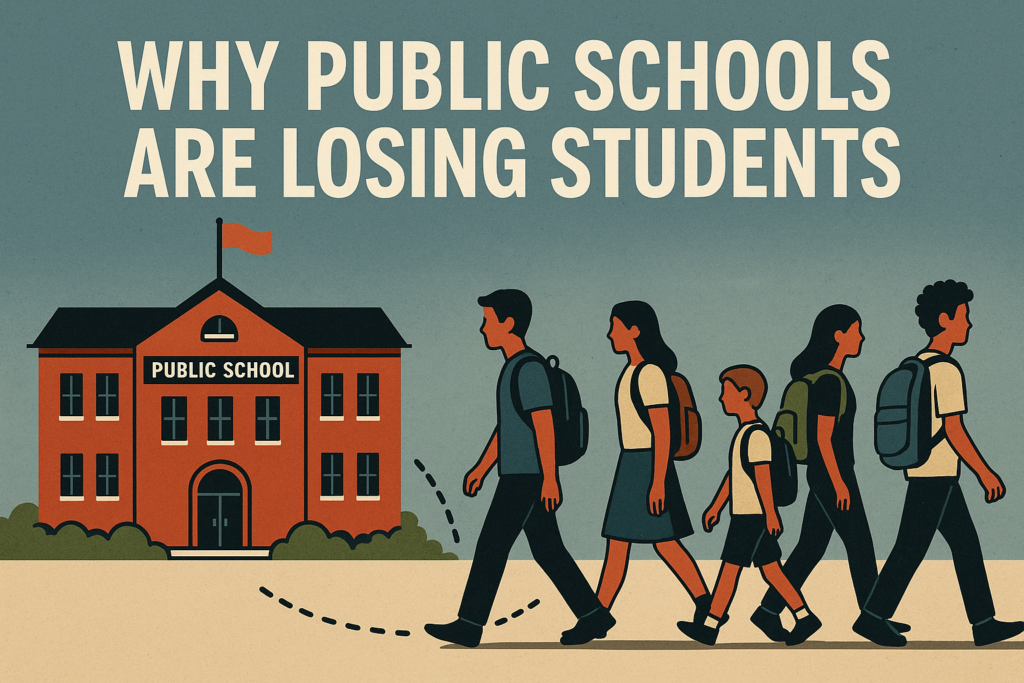
Public education in the United States is struggling. The gap between public and private schools is widening, and families are increasingly pulling their children out of public classrooms. While private schools have always had certain advantages, the growing dissatisfaction with public education reflects deeper issues that need attention.
The Shift Away from Academic Priorities
Many parents and educators are concerned that public schools are focusing less on academic fundamentals and more on social and political topics, particularly related to gender and identity. This shift is not always welcomed, especially when it seems to replace math, science, reading, and writing with lessons that students may not be developmentally ready to process.
Sex education is important, and students do need guidance on relationships and safety. But turning that guidance into a complex exploration of identity, especially for younger students, can create confusion. Parents want clarity and structure in education, not ambiguity and distraction from academic goals.
What Private Schools Are Doing Right
Top-performing private schools do not ignore emotional development. They simply build it on a foundation of academic rigor. These schools hold students to high standards, both in behavior and learning. They focus on outcomes. They teach students how to think, solve problems, and manage responsibilities.
Public schools do not need to copy private schools completely, but they can take inspiration from what works. Reinforcing core subjects like advanced reading, mathematics, science, history, and financial literacy can give students the tools they need to succeed. These areas create real-world competence and should be treated as top priorities.
Empowering Teachers, Not Politicizing Classrooms
One major problem in public education is the pressure placed on teachers. Many educators feel that any decision they make in the classroom could be misunderstood, challenged, or attacked. That kind of climate does not encourage good teaching. It encourages caution and silence.
Teachers need clear support to teach what matters. This means giving them the space to focus on academic achievement and protecting them from being pulled into political controversy. If we want students to thrive, we must let teachers focus on teaching.
The Role of School Choice and Competition
One solution that continues to gain momentum is school choice. When charter schools, magnet programs, and voucher options are available, public schools are forced to step up. They must listen to families, improve their performance, and show real results. Competition does not destroy public schools, it improves them.
Parents are no longer passive about education. They are looking at test scores, school rankings, and classroom environments. If a school cannot meet basic expectations, families will go elsewhere. That pressure should not be feared. It should be welcomed as a tool for improvement.
The Rise of Homeschooling
Homeschooling is on the rise, even among parents who once trusted the public system. Many feel they have no choice. They are choosing the controlled environment of home over the unpredictable landscape of public education.
But homeschooling comes with trade-offs. While it may offer a focused academic experience, it often lacks the social structure that schools naturally provide. Students miss out on teamwork, public speaking, social dynamics, and the chance to interact with diverse peers. These are critical parts of a full education.
Rather than losing these students, public schools should work to win them back. That starts with listening to parents, addressing their concerns, and creating a culture of academic integrity and respect.
Restoring Trust Between Schools and Families
Parents are not the enemy. They are the primary stakeholders in their children’s futures. When they voice concerns, they should not be dismissed or labeled. Public schools must engage families in open conversations about curriculum, discipline, expectations, and goals.
Most parents want the same things: strong academics, respectful classrooms, and preparation for life beyond graduation. Meeting those expectations builds trust and loyalty. Ignoring them pushes families away.
Reinvesting in Great Teachers
None of this works without excellent teachers. Public schools need to pay teachers more, offer clear career paths, and reduce the red tape that keeps them from doing what they love. Teaching should be a respected, rewarding profession.
When teachers are supported, they stay. When they are buried in bureaucracy or pulled into controversy, they leave. And when they leave, students suffer. Investing in teachers is investing in the future.
A Call to Refocus
Public education in the United States is not beyond saving. But it needs a course correction. The focus must return to academics, the classroom must be a space for learning, and schools must rebuild trust with the families they serve.
Let schools be schools again. Let teachers teach. Let students learn. That is the foundation of a better future.
